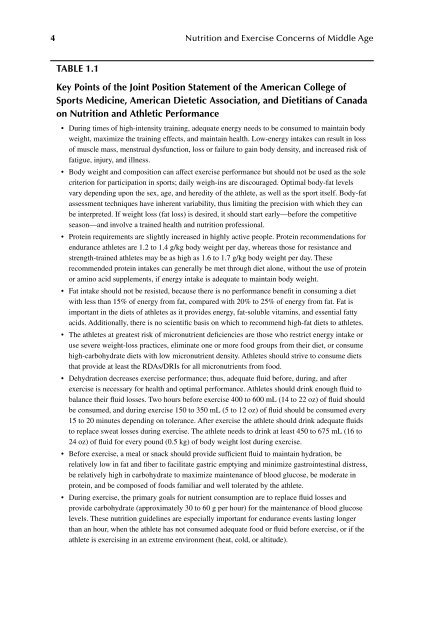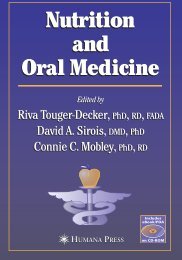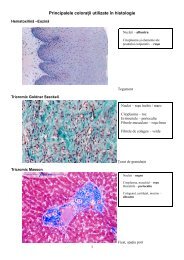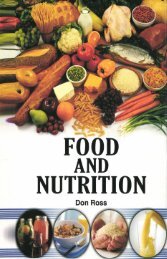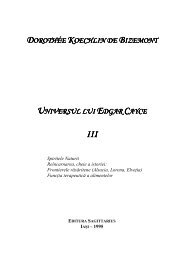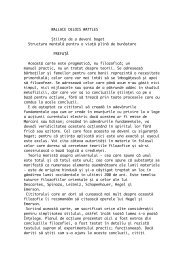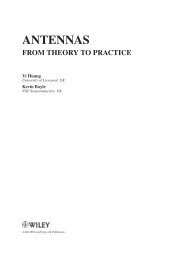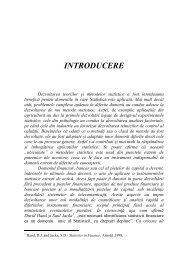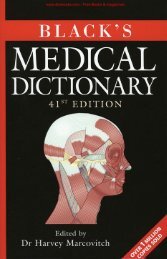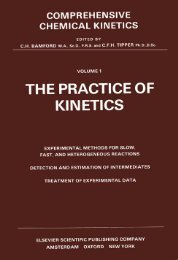- Page 2: Nutrition andExercise ConcernsofMid
- Page 5 and 6: CRC PressTaylor & Francis Group6000
- Page 8 and 9: ContentsPreface....................
- Page 10: ContentsixSection VIII Age-Related
- Page 14: The EditorJudy Anne Driskell, Ph.D.
- Page 17 and 18: xviJi-Young Lee, Ph.D.Department of
- Page 20: Section IIntroduction
- Page 25 and 26: 6 Nutrition and Exercise Concerns o
- Page 27 and 28: 8 Nutrition and Exercise Concerns o
- Page 29 and 30: 10 Nutrition and Exercise Concerns
- Page 31 and 32: 12 Nutrition and Exercise Concerns
- Page 33 and 34: 14 Nutrition and Exercise Concerns
- Page 35 and 36: 16 Nutrition and Exercise Concerns
- Page 37 and 38: 18 Nutrition and Exercise Concerns
- Page 39 and 40: 20 Nutrition and Exercise Concerns
- Page 41 and 42: 22 Nutrition and Exercise Concerns
- Page 44 and 45: 2 CarbohydratesMichael S. Green and
- Page 46 and 47: Carbohydrates 27Table 2.1Common Sou
- Page 48 and 49: Carbohydrates 29intestinal villi. G
- Page 50 and 51: Carbohydrates 31Clif bar (101)Gator
- Page 52 and 53: Carbohydrates 33total body storage
- Page 54 and 55: Carbohydrates 35blood glucose level
- Page 56 and 57: Carbohydrates 37being consumed with
- Page 58 and 59: Carbohydrates 39coupled with the en
- Page 60 and 61: Carbohydrates 41Table 2.3Carbohydra
- Page 62 and 63: Carbohydrates 43of carbohydrate unt
- Page 64 and 65: Carbohydrates 45applicable to older
- Page 66 and 67: Carbohydrates 47Table 2.4Summary of
- Page 68 and 69: Carbohydrates 4927. Dohm, G.L., Bee
- Page 70: Carbohydrates 5166. Maehlum, S., Ho
- Page 73 and 74:
54 Nutrition and Exercise Concerns
- Page 75 and 76:
56 Nutrition and Exercise Concerns
- Page 77 and 78:
58 Nutrition and Exercise Concerns
- Page 79 and 80:
60 Nutrition and Exercise Concerns
- Page 81 and 82:
62 Nutrition and Exercise Concerns
- Page 83 and 84:
64 Nutrition and Exercise Concerns
- Page 85 and 86:
66 Nutrition and Exercise Concerns
- Page 87 and 88:
68 Nutrition and Exercise Concerns
- Page 89 and 90:
70 Nutrition and Exercise Concerns
- Page 91 and 92:
72 Nutrition and Exercise Concerns
- Page 93 and 94:
74 Nutrition and Exercise Concerns
- Page 95 and 96:
76 Nutrition and Exercise Concerns
- Page 97 and 98:
78 Nutrition and Exercise Concerns
- Page 99 and 100:
80 Nutrition and Exercise Concerns
- Page 101 and 102:
82 Nutrition and Exercise Concerns
- Page 103 and 104:
84 Nutrition and Exercise Concerns
- Page 106 and 107:
4 ProteinsBrian S. Snyder and Mark
- Page 108 and 109:
Proteins 89Table 4.1Essential, Cond
- Page 110 and 111:
Proteins 91new steady state of nitr
- Page 112 and 113:
Proteins 93buffer to amino acid ing
- Page 114 and 115:
Proteins 95positive NPSnegative NPS
- Page 116 and 117:
Proteins 97It has been suggested th
- Page 118 and 119:
Proteins 99C. ti m i n g o f Pr o t
- Page 120 and 121:
Proteins 101VI. concernsA. re n a l
- Page 122 and 123:
Proteins 10311. Institute of Medici
- Page 124 and 125:
Proteins 10547. Volpi, E., Sheffiel
- Page 126 and 127:
Proteins 10785. Lemon, P.W., Beneve
- Page 128:
Section IIIVitamins
- Page 131 and 132:
112 Nutrition and Exercise Concerns
- Page 133 and 134:
114 Nutrition and Exercise Concerns
- Page 135 and 136:
116 Nutrition and Exercise Concerns
- Page 137 and 138:
118 Nutrition and Exercise Concerns
- Page 139 and 140:
120 Nutrition and Exercise Concerns
- Page 141 and 142:
122 Nutrition and Exercise Concerns
- Page 143 and 144:
124 Nutrition and Exercise Concerns
- Page 145 and 146:
126 Nutrition and Exercise Concerns
- Page 147 and 148:
128 Nutrition and Exercise Concerns
- Page 149 and 150:
130 Nutrition and Exercise Concerns
- Page 151 and 152:
132 Nutrition and Exercise Concerns
- Page 153 and 154:
134 Nutrition and Exercise Concerns
- Page 155 and 156:
136 Nutrition and Exercise Concerns
- Page 157 and 158:
138 Nutrition and Exercise Concerns
- Page 159 and 160:
140 Nutrition and Exercise Concerns
- Page 161 and 162:
142 Nutrition and Exercise Concerns
- Page 163 and 164:
144 Nutrition and Exercise Concerns
- Page 165 and 166:
146 Nutrition and Exercise Concerns
- Page 167 and 168:
148 Nutrition and Exercise Concerns
- Page 169 and 170:
150 Nutrition and Exercise Concerns
- Page 171 and 172:
152 Nutrition and Exercise Concerns
- Page 173 and 174:
154 Nutrition and Exercise Concerns
- Page 175 and 176:
156 Nutrition and Exercise Concerns
- Page 177 and 178:
158 Nutrition and Exercise Concerns
- Page 179 and 180:
160 Nutrition and Exercise Concerns
- Page 181 and 182:
162 Nutrition and Exercise Concerns
- Page 183 and 184:
164 Nutrition and Exercise Concerns
- Page 185 and 186:
166 Nutrition and Exercise Concerns
- Page 188 and 189:
7 B-VitaminsGeorge U. Liepa, Sandra
- Page 190 and 191:
B-Vitamins 171II. tHIAMIn (Vitamin
- Page 192 and 193:
B-Vitamins 173design and should the
- Page 194 and 195:
B-Vitamins 1750.9 micrograms/kcal.
- Page 196 and 197:
B-Vitamins 177NA. Interestingly, ad
- Page 198 and 199:
B-Vitamins 179site of CoA synthesis
- Page 200 and 201:
B-Vitamins 181include weakness, irr
- Page 202 and 203:
B-Vitamins 183and severe burns. Of
- Page 204 and 205:
B-Vitamins 185A deficiency of vitam
- Page 206 and 207:
B-Vitamins 1877. Webster, M.J., Phy
- Page 208:
B-Vitamins 18945. Hu, F.B., Stampfe
- Page 212 and 213:
8Major Minerals—Calcium, Magnesiu
- Page 214 and 215:
Major Minerals— 195endoplasmic or
- Page 216 and 217:
Major Minerals— 197lead) contamin
- Page 218 and 219:
Major Minerals— 199active healthy
- Page 220 and 221:
Major Minerals— 201level regulate
- Page 222 and 223:
Major Minerals— 203determines cel
- Page 224 and 225:
Major Minerals— 205muscle cramps,
- Page 226 and 227:
Major Minerals— 207the assessment
- Page 228 and 229:
Major Minerals— 209becomes import
- Page 230 and 231:
Major Minerals— 211H. in t e r a
- Page 232 and 233:
Major Minerals— 213ratio induces
- Page 234 and 235:
Major Minerals— 21525. Coudray, C
- Page 236 and 237:
Major Minerals— 21759. Leichsenri
- Page 238 and 239:
9 IronEmily M. HaymesContentsI. Int
- Page 240 and 241:
Iron 221is released from heme and b
- Page 242 and 243:
Iron 223women exceeded the RDA, the
- Page 244 and 245:
Iron 225Table 9.1Prevalence of Low
- Page 246 and 247:
Iron 227B. pe r f o r m a n c e En
- Page 248 and 249:
Iron 229will increase the amount of
- Page 250 and 251:
Iron 23139. DeRuisseau, K. C., Cheu
- Page 252 and 253:
10Trace ElementsExcluding Iron—Ch
- Page 254 and 255:
Trace Elements Excluding Iron—Chr
- Page 256 and 257:
Trace Elements Excluding Iron—Chr
- Page 258 and 259:
Trace Elements Excluding Iron—Chr
- Page 260 and 261:
Trace Elements Excluding Iron—Chr
- Page 262 and 263:
Trace Elements Excluding Iron—Chr
- Page 264 and 265:
Trace Elements Excluding Iron—Chr
- Page 266 and 267:
Trace Elements Excluding Iron—Chr
- Page 268 and 269:
Trace Elements Excluding Iron—Chr
- Page 270:
Section VFluids and Hydration
- Page 273 and 274:
254 Nutrition and Exercise Concerns
- Page 275 and 276:
256 Nutrition and Exercise Concerns
- Page 277 and 278:
258 Nutrition and Exercise Concerns
- Page 279 and 280:
260 Nutrition and Exercise Concerns
- Page 281 and 282:
262 Nutrition and Exercise Concerns
- Page 283 and 284:
264 Nutrition and Exercise Concerns
- Page 285 and 286:
266 Nutrition and Exercise Concerns
- Page 288 and 289:
12Caffeine and TanninsJay Kandiah a
- Page 290 and 291:
Caffeine and Tannins 271that ingest
- Page 292 and 293:
Caffeine and Tannins 273Table 12.2P
- Page 294 and 295:
Caffeine and Tannins 275II. tAnnins
- Page 296 and 297:
Caffeine and Tannins 277constipatio
- Page 298 and 299:
Caffeine and Tannins 279References1
- Page 300:
Caffeine and Tannins 28143. Lin, Y.
- Page 303 and 304:
284 Nutrition and Exercise Concerns
- Page 305 and 306:
286 Nutrition and Exercise Concerns
- Page 307 and 308:
288 Nutrition and Exercise Concerns
- Page 309 and 310:
290 Nutrition and Exercise Concerns
- Page 311 and 312:
292 Nutrition and Exercise Concerns
- Page 313 and 314:
294 Nutrition and Exercise Concerns
- Page 315 and 316:
296 Nutrition and Exercise Concerns
- Page 317 and 318:
298 Nutrition and Exercise Concerns
- Page 319 and 320:
300 Nutrition and Exercise Concerns
- Page 321 and 322:
302 Nutrition and Exercise Concerns
- Page 323 and 324:
304 Nutrition and Exercise Concerns
- Page 325 and 326:
306 Nutrition and Exercise Concerns
- Page 327 and 328:
308 Nutrition and Exercise Concerns
- Page 329 and 330:
310 Nutrition and Exercise Concerns
- Page 331 and 332:
312 Nutrition and Exercise Concerns
- Page 334:
Section VIIRecreational Activities
- Page 337 and 338:
318 Nutrition and Exercise Concerns
- Page 339 and 340:
320 Nutrition and Exercise Concerns
- Page 341 and 342:
322 Nutrition and Exercise Concerns
- Page 343 and 344:
324 Nutrition and Exercise Concerns
- Page 345 and 346:
326 Nutrition and Exercise Concerns
- Page 347 and 348:
328 Nutrition and Exercise Concerns
- Page 349 and 350:
330 Nutrition and Exercise Concerns
- Page 351 and 352:
332 Nutrition and Exercise Concerns
- Page 353 and 354:
334 Nutrition and Exercise Concerns
- Page 355 and 356:
336 Nutrition and Exercise Concerns
- Page 357 and 358:
338 Nutrition and Exercise Concerns
- Page 359 and 360:
340 Nutrition and Exercise Concerns
- Page 361 and 362:
342 Nutrition and Exercise Concerns
- Page 363 and 364:
344 Nutrition and Exercise Concerns
- Page 365 and 366:
346 Nutrition and Exercise Concerns
- Page 367 and 368:
348 Nutrition and Exercise Concerns
- Page 369 and 370:
350 Nutrition and Exercise Concerns
- Page 371 and 372:
352 Nutrition and Exercise Concerns
- Page 373 and 374:
354 Nutrition and Exercise Concerns
- Page 375 and 376:
356 Nutrition and Exercise Concerns
- Page 377 and 378:
358 Nutrition and Exercise Concerns
- Page 379 and 380:
360 Nutrition and Exercise Concerns
- Page 381 and 382:
362 Nutrition and Exercise Concerns
- Page 383 and 384:
364 Nutrition and Exercise Concerns
- Page 385 and 386:
366 Nutrition and Exercise Concerns
- Page 387 and 388:
368 Nutrition and Exercise Concerns
- Page 389 and 390:
370 Nutrition and Exercise Concerns
- Page 391 and 392:
372 Nutrition and Exercise Concerns
- Page 393 and 394:
374 Nutrition and Exercise Concerns
- Page 395 and 396:
376 Nutrition and Exercise Concerns
- Page 397 and 398:
378 Nutrition and Exercise Concerns
- Page 399 and 400:
380 Nutrition and Exercise Concerns
- Page 401 and 402:
382 Nutrition and Exercise Concerns
- Page 403 and 404:
384 Nutrition and Exercise Concerns
- Page 405 and 406:
386 Nutrition and Exercise Concerns
- Page 407 and 408:
388 Nutrition and Exercise Concerns
- Page 409 and 410:
390 Nutrition and Exercise Concerns
- Page 411 and 412:
392 Nutrition and Exercise Concerns
- Page 414:
Section VIIIAge-Related Disorders
- Page 417 and 418:
398 Nutrition and Exercise Concerns
- Page 419 and 420:
400 Nutrition and Exercise Concerns
- Page 421 and 422:
402 Nutrition and Exercise Concerns
- Page 423 and 424:
404 Nutrition and Exercise Concerns
- Page 425 and 426:
406 Nutrition and Exercise Concerns
- Page 427 and 428:
408 Nutrition and Exercise Concerns
- Page 429 and 430:
410 Nutrition and Exercise Concerns
- Page 431 and 432:
412 Nutrition and Exercise Concerns
- Page 434 and 435:
17 CancerFarid E. AhmedContentsI. I
- Page 436 and 437:
Cancer 417Epidemiological and exper
- Page 438 and 439:
Cancer 419The role of calcium or vi
- Page 440 and 441:
Cancer 421these polyphenols seem to
- Page 442 and 443:
Cancer 423group availability, 6 its
- Page 444 and 445:
Cancer 425and caloric restraint) ar
- Page 446 and 447:
Cancer 427coupled with physical act
- Page 448 and 449:
Cancer 429C. he a d a n d Ne c k Ca
- Page 450 and 451:
Cancer 431lung cancer risk in femal
- Page 452 and 453:
Cancer 433increased risk for total,
- Page 454 and 455:
Cancer 435in men who consume large
- Page 456 and 457:
Cancer 437among 1065 incident kidne
- Page 458 and 459:
Cancer 439Table 17.1The Relationshi
- Page 460 and 461:
Cancer 441developed repair machiner
- Page 462 and 463:
Cancer 443of pro-inflammatory cytok
- Page 464 and 465:
Cancer 445determination of which ce
- Page 466 and 467:
Cancer 44715. Peters, U., Sinha, R.
- Page 468 and 469:
Cancer 44954. Boys, N. F., Stone, J
- Page 470 and 471:
Cancer 45191. Khuri, F. R., Kim, E.
- Page 472 and 473:
Cancer 453127. Schuurman, A. G., Go
- Page 474 and 475:
Cancer 455165. Hakim, I. A., Harris
- Page 476:
Appendix ARecommended Dietary Allow
- Page 480:
Appendix CRecommended Dietary Allow
- Page 484:
Appendix ETolerable Upper Intake Le
- Page 488:
Appendix GRecommended Dietary Intak
- Page 492:
Appendix IUpper Levels of Intake (U
- Page 496:
Appendix KWorld Health Organization
- Page 500:
Appendix MDaily Values for Adults a
- Page 503 and 504:
484 Appendix NRecommendation 5Anima
- Page 505 and 506:
486 Indexcupper intake level, 176pa
- Page 507 and 508:
488 Indextotal fat intake and, 417v
- Page 509 and 510:
490 Indexexercise and, 124food sour
- Page 511 and 512:
492 Indexdefinition of, 54dietary r
- Page 513 and 514:
494 IndexPhosphorus, 207-213body re
- Page 515 and 516:
496 IndexTrace elements, 233-250, s


